How does the Ryzen 9 7950X hold up today?
Updated: Dec 18, 2024 4:00 pm
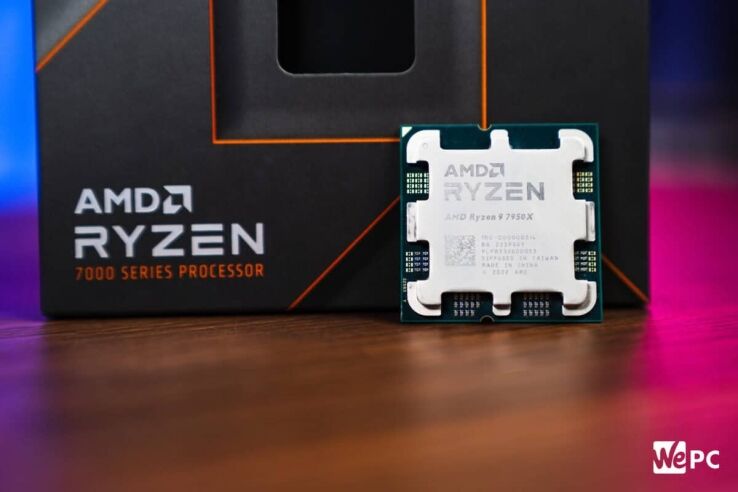
WePC is reader-supported. When you buy through links on our site, we may earn an affiliate commission. Prices subject to change. Learn more
The AMD Ryzen 9 7950X is the pinnacle of the 7000 series; it has the most cores, threads, and the highest clock speeds of any CPU belonging to that generation. So it must be good, right? This might be the best generation AMD has ever released, as the performance improvements made over Zen 3 were amazing. We would argue that the best CPU series AMD has made in the last 10 years has been the 7000 series. So, it bodes well for the 7950X.
This is a 16-core and 32-thread monster, clearly designed for heavy computing tasks and productivity workloads. That’s all well and good, sure, but can it game? This CPU is fantastic for gaming and does well in multi-core tests against even the best and most modern processors.
Specifications
- Cores: 16
- Threads: 32
- Base Speed: 4.5GHz
- Boost Speed: 5.7GHz
- Cache: 64MB
- Socket: AM5
What We Think
The 7950X is the best of the best when it comes to the 7000 series Ryzen processors. This CPU is perfect if you want to put together a hybrid work/game PC without absolutely destroying your wallet. AM5 offers a lot of longevity, especially since the recent release of the 9000 series CPUs. So you have plenty of upgrade opportunity, and aren’t locked to an inferior platform as you would be when selecting a 5000 series CPU.
Reasons to Buy
- Strong multithreaded performance
- Can be found for relatively cheap, especially when on sale
- Great for a hybrid gaming/workstation machine
- AM5 offers longevity
Reasons to Avoid
- Both the 7800X3D and 9800X3D beat it in gaming performance
- Stock can sometimes be iffy
Specifications and comparison
The Ryzen 9 7950X sits at the pinnacle of AMD’s Zen 4 lineup, offering flagship-tier performance for those demanding the best in multi-threaded workloads and gaming. With 16 cores and 32 threads, this chip is designed to handle everything from 4K video editing to rendering and high-refresh-rate gaming.
| Component | Ryzen 9 7950X |
|---|---|
| Cores | 16 |
| Threads | 32 |
| Base frequency | 4.5 GHz |
| Boost frequency | 5.7 GHz |
| Memory speed | 5200 MT/s |
| PCI Express lanes | 24 (Gen 5) |
| L2 cache | 64 KB (per core) |
| L3 cache | 64 MB (shared) |
| TDP / PPT | 170W / 230W |
| Process size | 5 nm |
| Socket | AM5 (compatible with X870E, X870, B850, B840, X670E, X670, B650E, B650, A620) |
Compared to its predecessor, the Ryzen 9 5950X, the 7950X offers higher clock speeds, a tweaked architecture. Compared to its closest Intel competitor, the Core i9-13900K, the Ryzen 9 7950X does well in multi-threaded tasks, making it a favourite for productivity-focused builds.
Design and platform features
The Ryzen 9 7950X introduces several platform-wide upgrades that set it apart from the previous generation (5000 series). Built on AMD’s newer AM5 socket, this processor shifts to a 5nm node, improving efficiency and thermal performance. The AM5 platform is a significant leap forward, supporting DDR5 memory, PCIe 5.0, and enhanced overclocking capabilities.
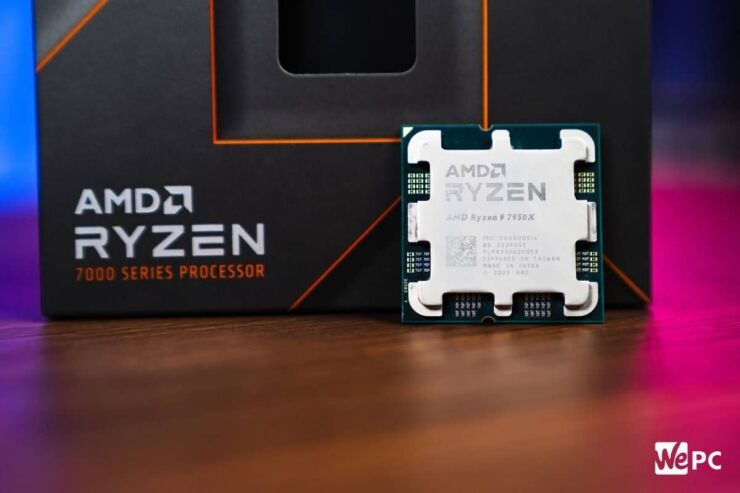
Despite its 170W TDP, the chip maintains respectable thermal performance, particularly when paired with high-end cooling solutions. AMD’s Precision Boost 2 and Eco Mode offer additional flexibility, allowing you to balance performance and power consumption based on your needs. While the move to AM5 means the Ryzen 9 7950X isn’t compatible with older AM4 motherboards, the platform is future-proofed, with AMD committing to supporting AM5 through at least 2025. For builders upgrading to DDR5, this ensures long-term value.
Performance
Before we jump into the nitty-gritty of how well the 7950X performed in our testing, it’s important to outline the environment we used to test the CPU. We try to use the same components across all tests where possible, but that isn’t possible, so we try to use comparable components.
Here’s the composition of the test bench we used to test the 7950X:
| Component | WePC test rig |
|---|---|
| CPU | Ryzen 9 7950X |
| Cooler | Corsair H150i Elite LCD |
| Motherboard | ASUS Crosshair Hero X670 |
| Memory | Corsair Dominator Platinum DDR5 @6800 MHz |
| GPU | MSI RTX 4070 Ti |
| PSU | ASUS Thor Platinum II 1000W |
| Case | Cooler Master Masterframe |
As you can see, we spared no expense when selecting components to test our hardware. We decided to use the RTX 4070 Ti as it represented the average performance of gaming computers rather than creating unrealistic expectations with something like the RTX 4090.
Gaming benchmarks
| Metric | CS2 | Days Gone | Doom Eternal | Horizon FW | Frost punk 2 |
|---|---|---|---|---|---|
| Score (FPS) | AVG: 460.07 99%: 180.21 |
AVG: 251.43 99%: 153.12 |
AVG: 449.32 99%: 289 |
AVG: 183.9 99%: 133.52 |
AVG: 207.26 99%: 139.11 |
| AVG temp (package) °C | 69 | 70 | 71 | 83 | 71 |
| Max temp (package) °C | 76 | 78 | 75 | 84 | 74 |
| Average PPT (W) | 132.29W | 118.22W | 145.55W | 145.47W | 133.65W |
Here, we have presented, and compared our findings to other CPUs we have tested in graph form because tables (in our opinion) are pretty hard to follow when a lot is going on.
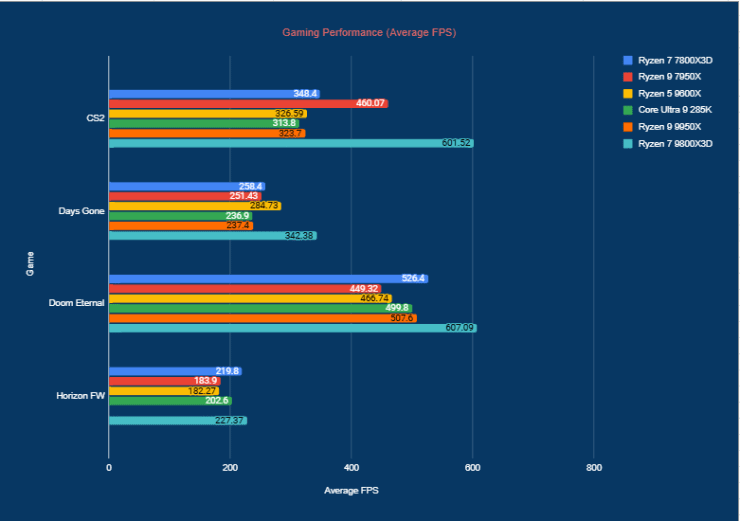
In CS2, the Ryzen 7 9800X3D is the clear winner, as it is in all games, achieving an impressive 601.52 FPS, thanks to its 3D V-Cache technology, which significantly boosts gaming performance in latency-sensitive titles like CS2. The Ryzen 9 7950X delivers a respectable 460.07 FPS, but it’s outclassed by the 9800X3D and even the Ryzen 7 7800X3D (348.4 FPS), which similarly benefits from 3D V-Cache. Intel’s Core Ultra 9 285K and Ryzen 5 9600X trail at 313.8 FPS and 326.59 FPS, respectively, showing their limitations in this fast-paced game.
Days Gone shows the Ryzen 7 9800X3D again leads with 342.38 FPS, leveraging its cache-heavy design to efficiently handle the game’s larger world streaming requirements. Surprisingly, the Ryzen 5 9600X outperforms the 7950X here, with 284.73 FPS compared to 251.43 FPS, suggesting that single-core optimization in this game favours the lower-tier chip. The Core Ultra 9 285K (236.9 FPS) and Ryzen 9 9950X (237.4 FPS) fall behind, making them less ideal for gaming-focused builds.
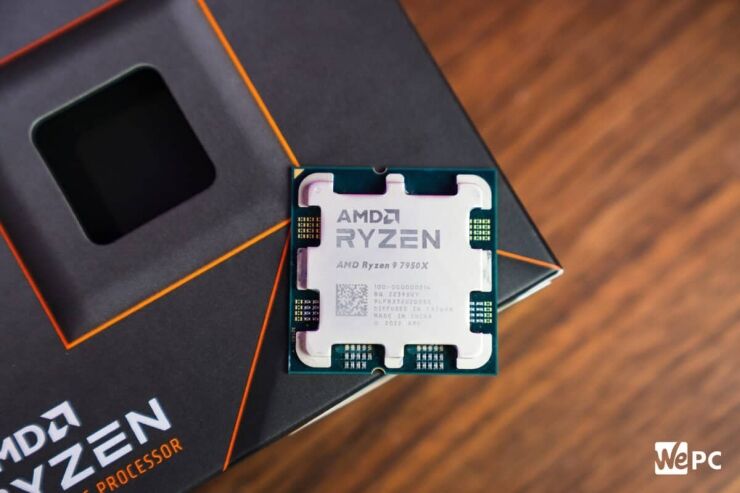
In the graphically demanding Horizon: Forbidden West, the Ryzen 7 9800X3D leads again with 227.37 FPS, showing its ability to excel in modern, open-world titles. The Ryzen 7 7800X3D (219.8 FPS) also performs admirably, followed by the Core Ultra 9 285K (202.6 FPS) and the 7950X at 183.9 FPS. Interestingly, the Ryzen 5 9600X isn’t far behind at 182.27 FPS, demonstrating that budget CPUs can still compete in specific titles.
While the Ryzen 9 7950X is a productivity powerhouse, it doesn’t dominate in gaming benchmarks, where cache-heavy CPUs like the Ryzen 7 9800X3D and Ryzen 7 7800X3D shine. If your priority is gaming, the 3D V-Cache-equipped Ryzen processors consistently outperform others, especially in latency-sensitive or graphically demanding titles.
However, if you want value, the Ryzen 5 9600X impresses with competitive performance in some titles, such as Days Gone and Doom Eternal. Meanwhile, Intel’s Core Ultra 9 285K shows solid results but often lags behind AMD’s latest offerings in gaming workloads. The Ryzen 9 9950X is a compelling middle ground for a balanced gaming and productivity build, but if pure gaming is your focus, the Ryzen 7 9800X3D stands unmatched.
Synthetic benchmarks
| Metric | CPU Z | Cinebench R23 | Geekbench | Blender render |
|---|---|---|---|---|
| Score (points) | Single 765.8 Multi 15,496 |
Single 1,871 Multi 36,404 |
Single 3,027 Multi 20,344 |
Monster: 236.23 SPM Junkshop: 171.41 SPM Classroom: 121.03 SPM |
| AVG temp (package) °C | 81 | Single: 72 Multi: 88 |
66 | 92 |
| Max temp (package) °C | 93 | Single: 89 Multi: 95 |
89 | 95 |
| Average PPT (W) | 146.29W | Single: 90.06W Multi: 190.95W |
80.15W | 204.6W |
The Ryzen 9 7950X manages 15,496 points in CPU-Z multi, showcasing its 16-core design and impressive clock speeds. While the Ryzen 7 7800X3D trails with 7,248, the Ryzen 5 9600X barely competes at 6,563. Intel’s Core Ultra 9 285K leads the chart at 18,866, cementing its edge in raw multi-threaded workloads. However, AMD’s offering closes the gap when considering efficiency and power consumption.
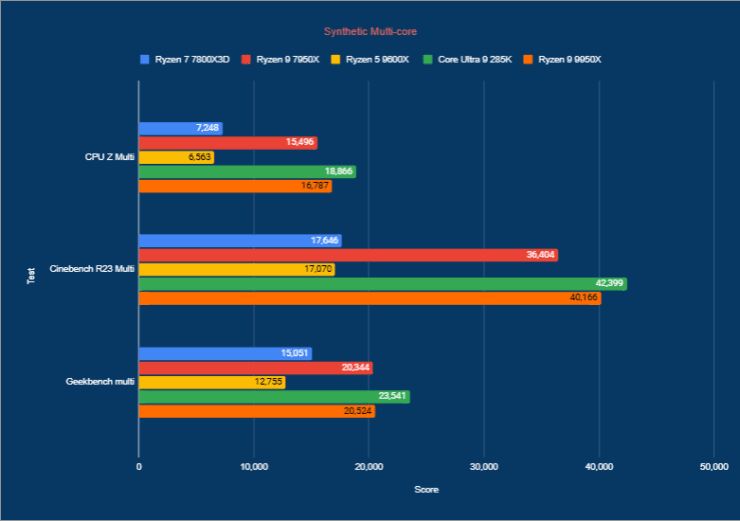
Cinebench R23 highlights AMD’s architectural efficiency, with the Ryzen 9 7950X reaching 36,404 points. While it’s outperformed by the Core Ultra 9 285K at 42,399, this is more of a margin reflecting Intel’s power-hungry nature. The 7800X3D performs admirably at 17,646, balancing gaming and creative performance. Meanwhile, the 9600X lands at 17,070, highlighting that it’s designed more for budget systems.
Geekbench scores again emphasize AMD’s balanced design. The Ryzen 9 7950X achieves 20,344, which, while strong, lags behind Intel’s 23,541. However, it far surpasses the 7800X3D (15,051) and the 9600X (12,755), reiterating its position as a high-end multitasking CPU. The Core Ultra 9 285K takes the crown, but the 7950X offers better thermals and cost efficiency.
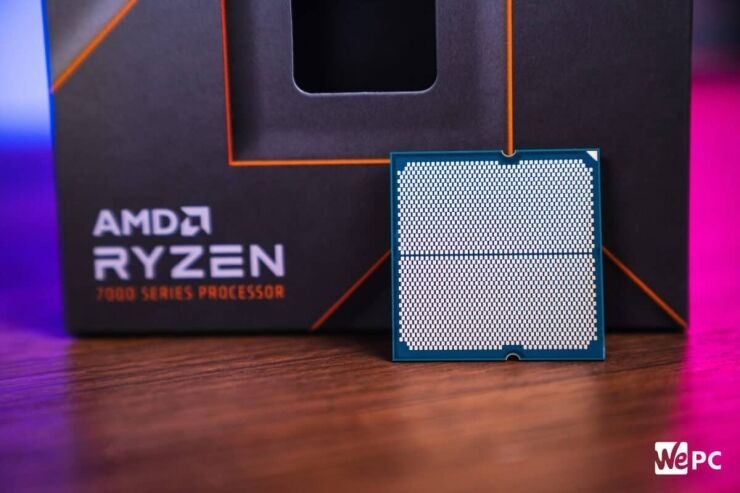
Regarding power consumption, the Ryzen 9 7950X’s performance comes at the cost of increased energy draw, consistently ranking as one of the most power-hungry CPUs in our gaming tests. In CS2, it draws an impressive 132.29W, highlighting its enthusiast-level design. Meanwhile, the Ryzen 7 7800X3D and Core Ultra 9 285K demonstrate their efficiency-focused architecture, using only 55.6W and 48.5W, respectively – making them ideal if you are looking to balance power consumption with performance.
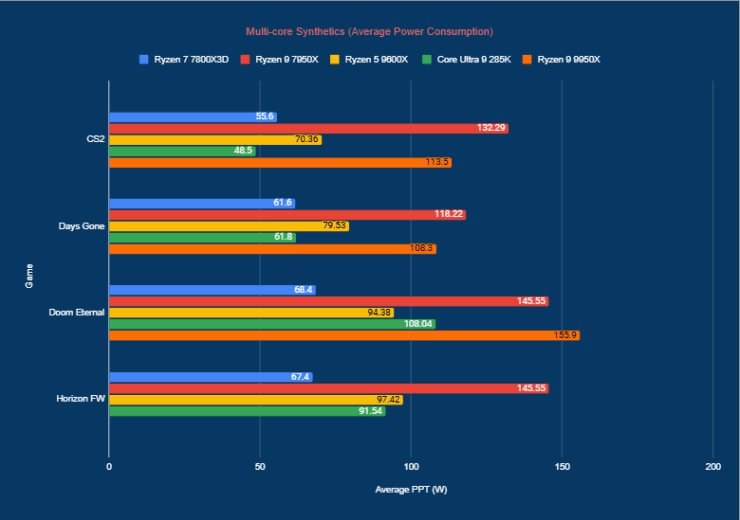
For open-world titles like Days Gone, the 7950X’s draw dips slightly to 118.22W, but it still far exceeds the efficiency-focused Ryzen 7 7800X3D (61.6W) and Core Ultra 9 285K (61.8W), both of which deliver excellent results without excessive energy use. Even the Ryzen 5 9600X, a mid-range contender, maintains relatively moderate consumption at 79.53W, while the Ryzen 9 9950X remains power-hungry at 108.3W.
Overall, the Ryzen 9 7950X delivers strong gaming performance but at a steep power cost, making it less ideal for those prioritizing energy efficiency. Conversely, the Ryzen 7 7800X3D continues to impress with its ability to provide top-tier gaming performance while maintaining low power consumption, making it a standout choice for energy-conscious gamers.
Gaming performance vs. price
In gaming, the Ryzen 9 7950X delivers impressive results but doesn’t always justify its price tag compared to cheaper options like the Ryzen 7 7800X3D. For instance, while the 7950X achieves reasonable frame rates in CS2 and Doom Eternal, the 7800X3D, priced at approximately $449, provides better gaming performance and greater power efficiency. This makes the 7800X3D a better choice if you seek maximum value per dollar spent.
The 7950X shines in productivity tasks, with 36,404 points in Cinebench R23 Multi and 20,344 in Geekbench Multi. These scores dominate lower-tier CPUs like the Ryzen 5 9600X; however, they are surpassed by the newer Core Ultra 9 285K (42,399 Cinebench). If you’re a professional tackling multi-threaded workloads like video editing, 3D rendering, or programming, the 7950X offers fantastic performance that justifies its cost—particularly when factoring in its relatively lower price than workstation-grade CPUs.
Efficiency concerns: Power draw and total cost
Where the Ryzen 9 7950X struggles is efficiency. Its power consumption can hit 145W+ in gaming, significantly higher than the 67W of the Ryzen 7 7800X3D or the 48.5W of the Core Ultra 9 285K. If you are running power-intensive applications frequently, this translates to higher electricity costs over time, diminishing its long-term value.
The Ryzen 9 7950X is a great choice if you need uncompromising multi-core performance and don’t mind higher power consumption. At $465, it’s an excellent choice for content creators, professionals, or enthusiasts balancing heavy productivity tasks with gaming. However, the Ryzen 7 7800X3D and Ryzen 5 9600X offer better value for pure gaming or budget-conscious buyers. The 7950X remains a niche choice: a brilliant CPU for those who need its specific strengths but less compelling for the average person just looking to play games.
